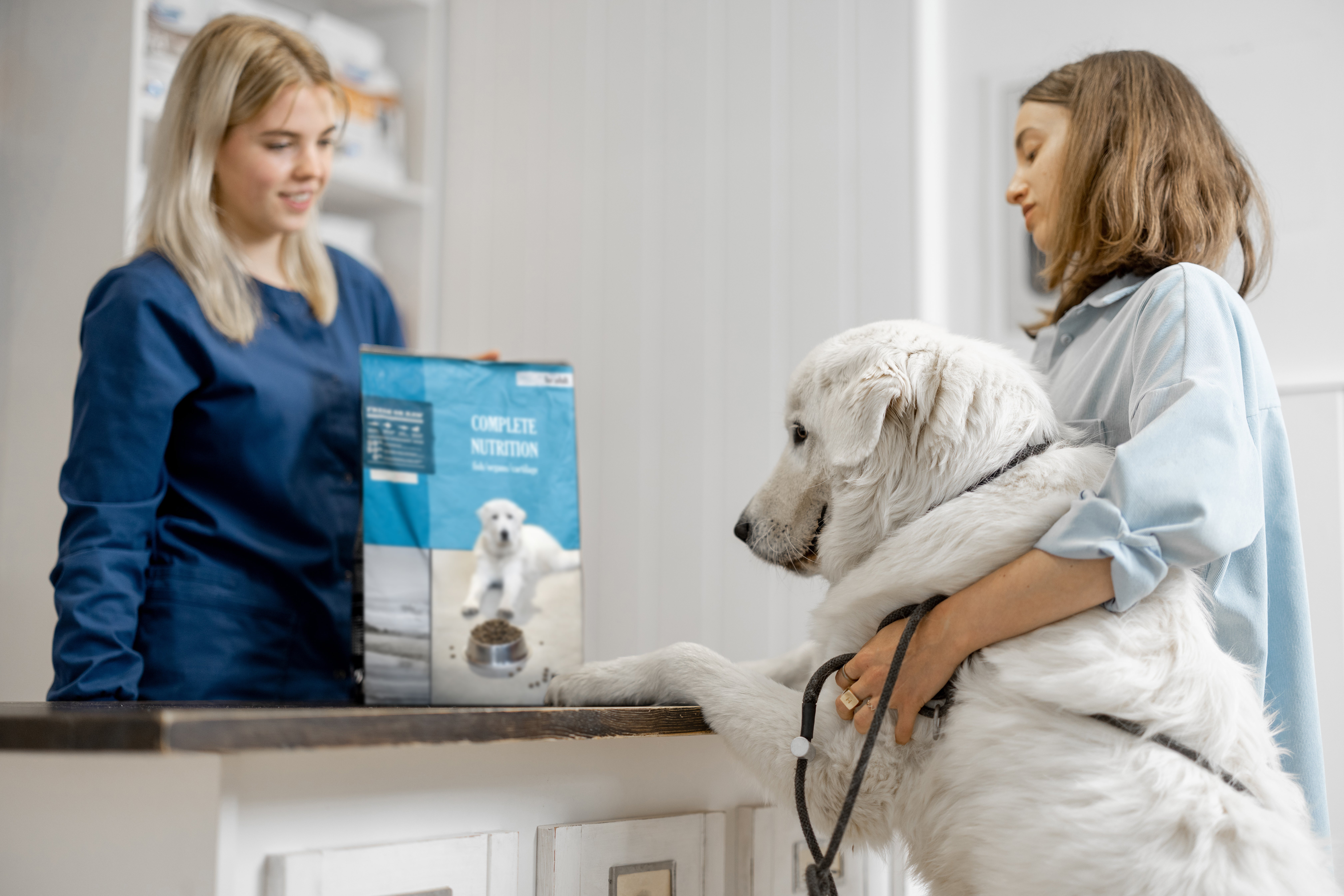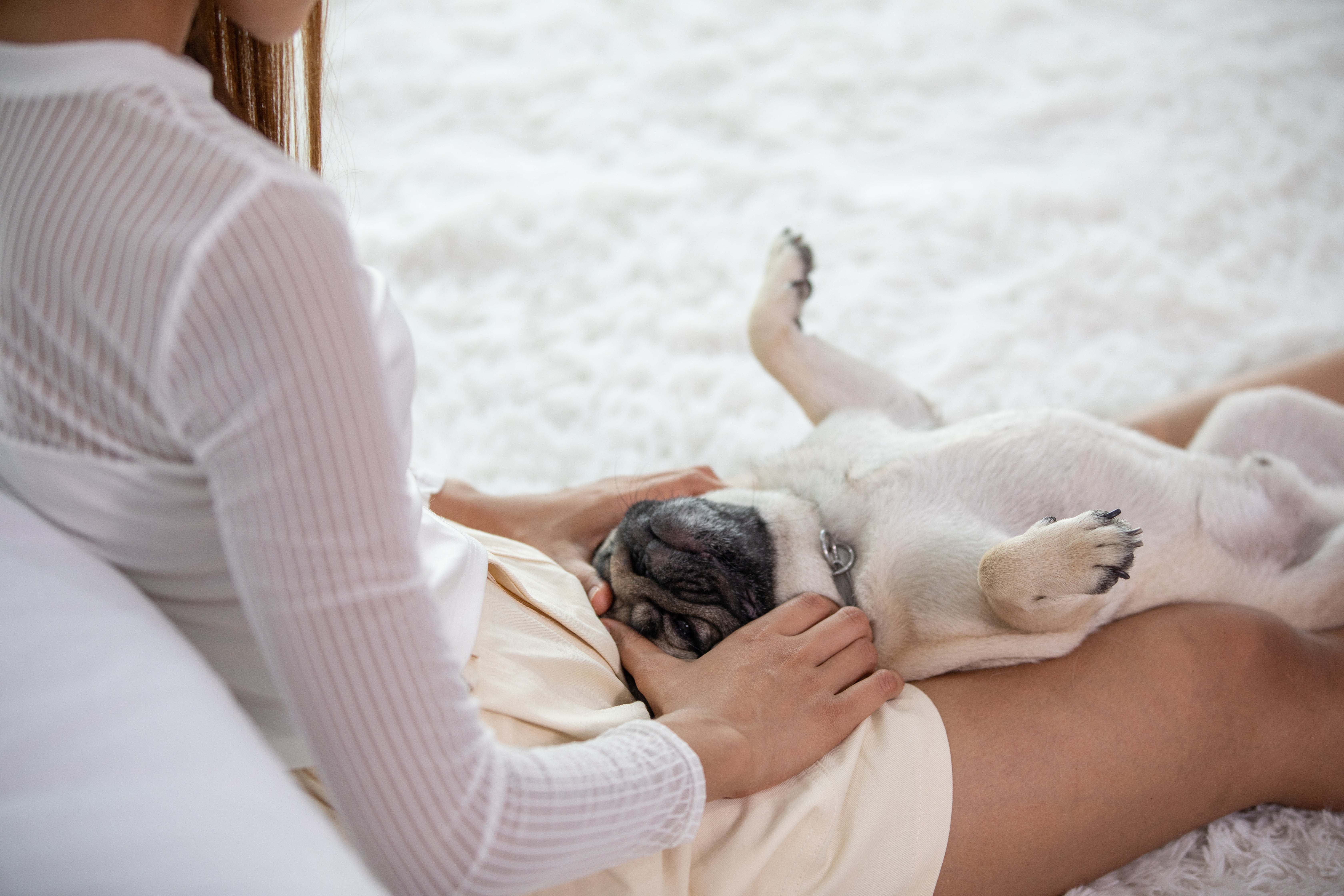Doggy gut health and kitty longevity diets: How the unstoppable force of wellness came for our pets
As human health becomes increasingly aspirational, Emilie Lavinia asks: do our four-legged friends really need wellness too, or have we taken things too far?


I’ll be the first to admit I’ve lost the plot when it comes to my dog. She’s on a posh raw food diet for optimal gut health, takes her steps and supplements daily, and gets brushed and massaged more often than I do. I’ve fed her doggy electrolytes, taken her to pup spas and splashed out on behavioural therapy sessions. Her wellbeing is as important to me as my own, but is all this really good for her health, or have I been sold an expensive fantasy?
Wellness products have become increasingly more expensive and good health now appears to be a modern-day status symbol. Against the bizarre backdrop of optimisation culture, pet wellness has emerged as the latest iteration. It begs the question: do our dogs and cats need this, or is the wellness industrial complex simply going after the one thing we’ll spend money on without question: our pets.
If a dog has regular walks and a vet-recommended meal plan, surely that’s enough? Veterinarian Guy Sandelowsky, also known as The Dog Doctor, doesn’t think so. He believes pet nutrition needs an overhaul and believes that we owe it to our four-legged friends to take better care of them, given the overwhelmingly positive impact they have on our wellbeing.
“As a vet, I’ve witnessed firsthand the transformative power of dogs in people’s lives. They are more than pets. They are our therapists, our companions, and sometimes, our lifeline,” he says.
“The simple act of stroking a dog can lower cortisol levels, ease stress, and increase feelings of happiness. Their unwavering presence offers a sense of security and routine, crucial for those struggling with mental health challenges.”
Many studies show that dogs do something positive to our brains. They make us better, so don’t we owe it to them to deliver the best possible care and ensure their health is looked after?
A leading voice in the human optimisation space, neuroscientist Andrew Huberman, recently spoke with Karolina Westlund, an ethologist and professor at the University of Stockholm, about this very subject on his podcast. Westlund specialises in animal emotion and behaviour, and uses science-based methods to improve the lives of animals in human care.
The pair discussed the often overlooked needs of domesticated animals, primarily dogs and cats, and the things we can do to improve their wellbeing and our relationship with them. In essence, Westlund believes that we have a responsibility to act as a conduit to deliver the best care to domesticated creatures who didn’t choose to be in our homes.
My dog has been with me for years and is part of my family. I understand her expressions, I know what she’s saying without words. So why wouldn’t I cater to her emotional and physical needs? Of course, I want her to be happy and to live for as long as possible.
Enter Loyal, a pet biotech company founded by California-based entrepreneur Celine Halioua. Her mission is to develop drugs that will extend the lifespan of dogs by delaying or preventing age-related disease. Halioua asks, “What if we could develop a preventive medicine for seemingly unrelated age-associated diseases like cancer, arthritis and cognitive decline, which all share the same root cause? It all sounds very much like modern wellness and the biohacking movement to me.”

“The goal of the company from day one has always been to get the first drug FDA approved for healthy lifespan extension,” Halioua told Slate magazine in April. And she claims she’s close. But Loyal aims to offer more than just drugs. Its purpose is to teach pet owners the breed-specific biohacks that will help their beloved pets live healthy lives beyond their average projected lifespan. Halioua calls it “compensating for the genetic mistakes” that dog breeding has caused.
How much a subscription to Loyal’s daily longevity supplement might cost pet owners is unknown, as it’s not yet available to buy. However, given how much a quality supplement for humans can cost on repeat subscription, it’s safe to say this service is likely to be one that the privileged few can afford.
Another parallel with the world of human health optimisation is expensive organic food, and fancy raw pet food is really having a moment. For animals, eating raw meat arguably makes more sense than it does for the influencers suffering through slabs of raw liver and guzzling offal.
I feed my pomeranians, Bella and Duke, a RAWsaf-accredited brand (meaning that all meats used in the food are tested for E coli and other bacteria to ensure they’re safe to eat raw). Incidentally, humans on the carnivore diet do not go by such accreditations.

But I still find myself asking, “Does my dog really need probiotic supplements, pre-prepared raw food, calming bedtime biscuits with human-grade organic ingredients and chicken-flavoured electrolytes?” Wild animals seem to manage just fine without all this.
“I think what we are probably seeing with pet wellness is an extension of the wider wellness perfectionism that’s been increasing in recent years,” says psychologist Dr Lara Zibarras. “We’ve gone from obsessing about our own health to obsessing about our pets’ health.”
Zibarras says we’re likely witnessing and partaking in a phenomenon called “psychological displacement”: “This is when people feel out of control in one area of life (let’s say work, study or relationships), so they end up hyper-focusing on other areas. So projecting wellness onto their pets could be one way to stay feeling in control, especially if other areas feel out of control.”
Are the pampered kittens I see having coconut oil rubbed into their toes while wearing under-eye patches needing a full spa day to be happy? But, then again, if the animals are enjoying it and it brings us joy, is there any harm in it?
Zibarras explains that though videos showing pet spa days might be cute, we’re now exposed to intense and unwavering levels of perfectionism presented by staged videos on social media.
.jpeg)
“In wellness culture, there’s this idea that if we just do everything right, then we will be happy, healthy, safe and successful. It’s possible that this is extending to our pets, [who] are now becoming a reflection of how ‘together’ we are.” Just like clean eating or fitness obsessions, pet wellness can become a status symbol. “We believe that doing pet wellness says something about who we are – caring for our pets and doing life ‘right’,” She says.
If we’re not mindful about all this, pet wellness stands to become yet another metric by which to measure whether we’re winning at life. Whether our dog’s gut health is optimal. Whether we’ve cracked their communication style, do our pets need wellness?
The honest answer is probably not, at least not in the way that humans, with all our anxieties and foibles, need healing. The very idea that we want to protect our beloved pets is admirable and natural, however, the idea that they need any of this special attention plays into wider anxieties about modern life, the rise of perfectionism, and the constant push to be more, do more, and live forever. When we use our pets to signal some kind of human success, we may have drifted from the true meaning of the word and into very bizarre and distorted territory indeed.
Join our commenting forum
Join thought-provoking conversations, follow other Independent readers and see their replies
Comments


Bookmark popover
Removed from bookmarks